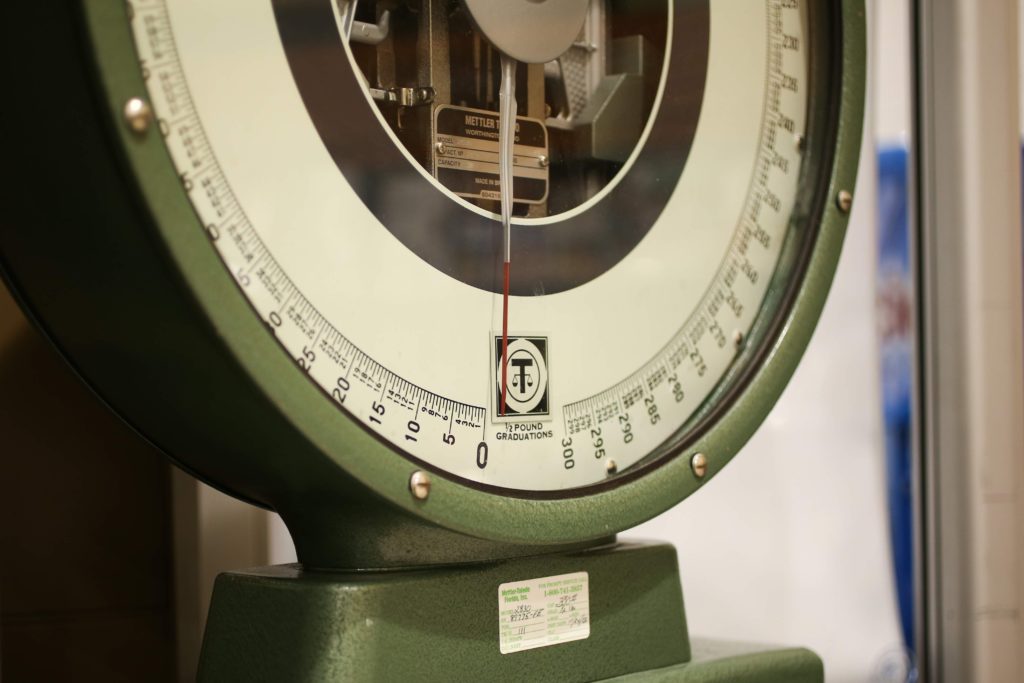Beauty | June 11th, 2020
The Publix Scale Began My Body Image Issues
By: Aiyana Ishmael

In this op-ed, Florida A&M University senior Aiyana Ishmael delves into her connection between the Publix scale and her perception of her body.
Upon entering the sliding doors of Publix you’re immediately drawn to the large lime-green grandfather clock-esque scale that sits adjacent to the shopping carts. Shoppers swiftly race to hop on the scale, making sure not to place their hands on the large silver railing that could adjust their weight— hyper kids make sure to do the opposite, swinging on the railing like a jungle gym.
Since its beginning, Publix has offered a scale inside its stores. So much so, it became a signature to weigh yourself before you begin shopping. Household scales weren’t common back when Publix got its start in 1940 and many businesses offered scales for people to use, but kept them outside and charged customers. George Jenkins, the creator of Publix, placed this scale inside his store and made it free for customers to use.
With the Publix scale placed at the front of the store, any and everyone entering after can pass by while you’re waiting for the final number to appear. This simple act might not seem strenuous for many, but for plus-size girls jumping on a scale in public means facing in front of so many people an intense emotion — shame.
As a child, entering the supermarket was a trip filled with joy. Going shopping with my family as a kid meant running around the store, grabbing snacks we didn’t necessarily need, and competing against my siblings to bag the most groceries. This was until I reached an age where I no longer was chubby. I was fat and that meant I had to hop on the scale, knowing my mother’s disapproving look would come next.
I’d then step down from the scale and shuffle through the store, leaving my confidence still weighing by the front door.
Knowing my weight wasn’t going to be where I needed it to be, I would have to face the insecurities I already dealt with internally — but now they were magnified for the world to see.
Being forced to share my weight with all the shoppers passing by lent to my constant invalidation towards my body. I don’t recall life before a scale. I wish I did because maybe there wouldn’t be so much pain related to it.
The Publix scale may have seemed helpful in its origin, but it ultimately made me uncomfortable every time I entered the store. I eventually never wanted to go to the store with anyone because I was worried I’d face public ridicule from the people with me and others that pass by. Even if shoppers didn’t take a glance at the scale while I was on it, it still felt like all eyes were on me.
I miss the time when that number on the scale had little effect on me. Now, all I know is stepping up and watching that arrow swing to the right — the heavier side.
Some trips to Publix were happier ones. Seeing if I lost weight meant cheers from my family, which led to passersby giving their nod of approval as I stepped off smiling. But, on bad weeks, when the weight I’d plan to lose refused to drop, stepping on that scale stripped so much of me. Every judgment day where the number didn’t lower meant a case I’d lost, giving that scale more power.
Growing up I realized I’d lost pieces of myself with every stop at Publix. I relied so much on the number on that scale rather than focusing on my actual mental and physical health.
Focusing on that number led to starvation, binge eating and then deep depressional phases when I gained it all back.
No matter how old I get passing that Publix scale brings back all the pain I carried inside. I’ve now reached a point where I don’t step on that scale anymore. I no longer have to face that public humiliation nor do I associate my progress to a number on a scale.
Creating healthy connections with my weight, in the long run, is more beneficial to my progress than any number.
The Publix scale is a staple for Southerners. But, for young, impressionable plus-size girls it can be detrimental to their self-image and value of life. My shame and my scale have a deep-rooted connection I’d never realized. But the day I decided to walk past it and not get on changed me for the better— and for that moment, I’m thankful.





